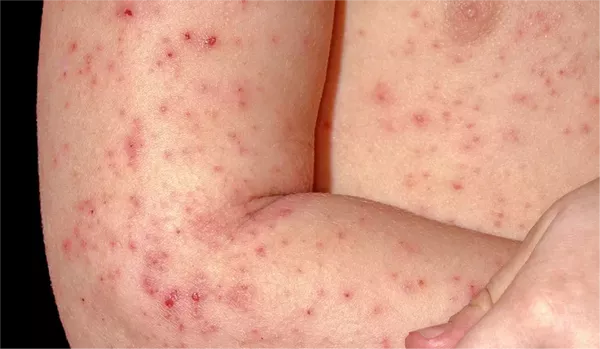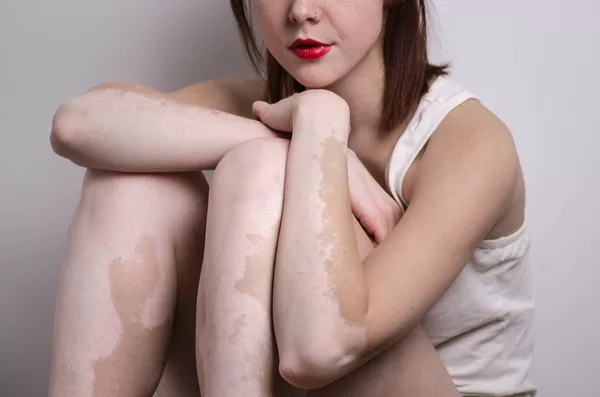Eczema is a common skin condition that affects millions of people worldwide, presenting in various forms and intensities. One specific type of eczema that deserves attention is follicular eczema, also known as follicular dermatitis or keratosis pilaris atrophicans faciei (KPAF). This dermatological condition is characterized by inflammation of the hair follicles, leading to distinctive symptoms and challenges for those affected.
What is Follicular Eczema?
Follicular eczema is a subtype of eczema that primarily affects the hair follicles. The condition often presents with symptoms such as small, raised bumps around hair follicles, resembling goosebumps or chicken skin. These bumps can be red, inflamed, itchy, or even painful. Over time, chronic inflammation in the affected follicles may lead to scarring and permanent changes in the skin texture.
Causes of Follicular Eczema
The exact cause of follicular eczema is not fully understood, but several factors are believed to contribute to its development:
1. Genetics: Family history plays a significant role in predisposing individuals to eczema, including follicular eczema. Certain genetic variations may affect the skin’s ability to retain moisture or regulate immune responses, leading to increased susceptibility to inflammatory skin conditions.
2. Skin Barrier Dysfunction: Disruption of the skin barrier function allows irritants, allergens, and bacteria to penetrate more easily, triggering inflammation within the hair follicles. Factors such as excessive dryness, harsh soaps, or frequent scratching can compromise the skin barrier.
3. Immune System Abnormalities: Dysregulation of the immune system is a common feature in eczema. In follicular eczema, immune cells may react excessively to normally harmless substances, leading to inflammation and skin damage.
4. Environmental Triggers: Exposure to certain environmental factors like dry air, low humidity, or seasonal changes can exacerbate follicular eczema symptoms. Additionally, contact with irritants or allergens in the environment can trigger flare-ups.
Symptoms of Follicular Eczema
The symptoms of follicular eczema can vary in severity and presentation but often include:
- Small Bumps: Raised bumps around hair follicles, especially on the arms, thighs, or face.
- Redness and Inflammation: The affected areas may appear red, swollen, or irritated.
- Itching and Discomfort: Itchy skin is a common complaint, which can worsen with scratching.
- Dryness and Scaling: The skin may feel dry, rough, or scaly, especially during flare-ups.
- Scarring and Skin Texture Changes: Chronic inflammation can lead to permanent changes in skin texture, including scarring or thickening of affected areas.
Diagnosing Follicular Eczema
Diagnosing follicular eczema typically involves a thorough examination of the affected skin and a review of medical history. In some cases, additional tests such as skin biopsies or allergy tests may be recommended to rule out other possible conditions or identify specific triggers.
Treatment Options
Management of follicular eczema focuses on reducing inflammation, relieving symptoms, and preventing flare-ups. Treatment options may include:
- Topical Steroids: Corticosteroid creams or ointments can help reduce inflammation and itching when applied to affected areas.
- Moisturizers: Regular use of emollients and moisturizing creams helps restore the skin barrier and alleviate dryness.
- Topical Calcineurin Inhibitors: These medications can be used as an alternative to steroids, particularly on sensitive areas like the face.
- Antihistamines: Oral antihistamines may be prescribed to alleviate itching and improve sleep quality.
- Avoiding Triggers: Identifying and avoiding triggers such as certain fabrics, harsh soaps, or specific foods can help prevent flare-ups.
- Phototherapy: In some cases, exposure to controlled doses of ultraviolet (UV) light under medical supervision can help improve symptoms.
Lifestyle and Self-Care Tips
In addition to medical treatment, individuals with follicular eczema can benefit from certain lifestyle modifications and self-care practices:
- Gentle Skincare: Use mild, fragrance-free cleansers and avoid hot showers, which can strip the skin of natural oils.
- Moisturize Regularly: Apply moisturizers immediately after bathing to lock in moisture.
- Wear Soft Fabrics: Choose clothing made from natural fibers like cotton to minimize irritation.
- Manage Stress: Stress can trigger or exacerbate eczema symptoms, so incorporating stress-reduction techniques such as meditation or yoga may be beneficial.
Long-Term Outlook
Follicular eczema is a chronic condition that may require long-term management. While it can be challenging to control, many individuals find relief through a combination of medical treatment, lifestyle adjustments, and diligent skincare. It’s essential for those affected to work closely with dermatologists or healthcare providers to develop a personalized treatment plan tailored to their specific needs.
Conclusion
In conclusion, follicular eczema is a distinct subtype of eczema characterized by inflammation of the hair follicles. Although the exact cause is not fully understood, a combination of genetic predisposition, immune system abnormalities, and environmental factors likely contributes to its development. Early diagnosis and appropriate treatment are crucial for managing symptoms, preventing complications, and improving quality of life for individuals living with follicular eczema. By understanding the condition and adopting effective management strategies, those affected can minimize its impact and achieve better long-term skin health.
Related Topics:
























